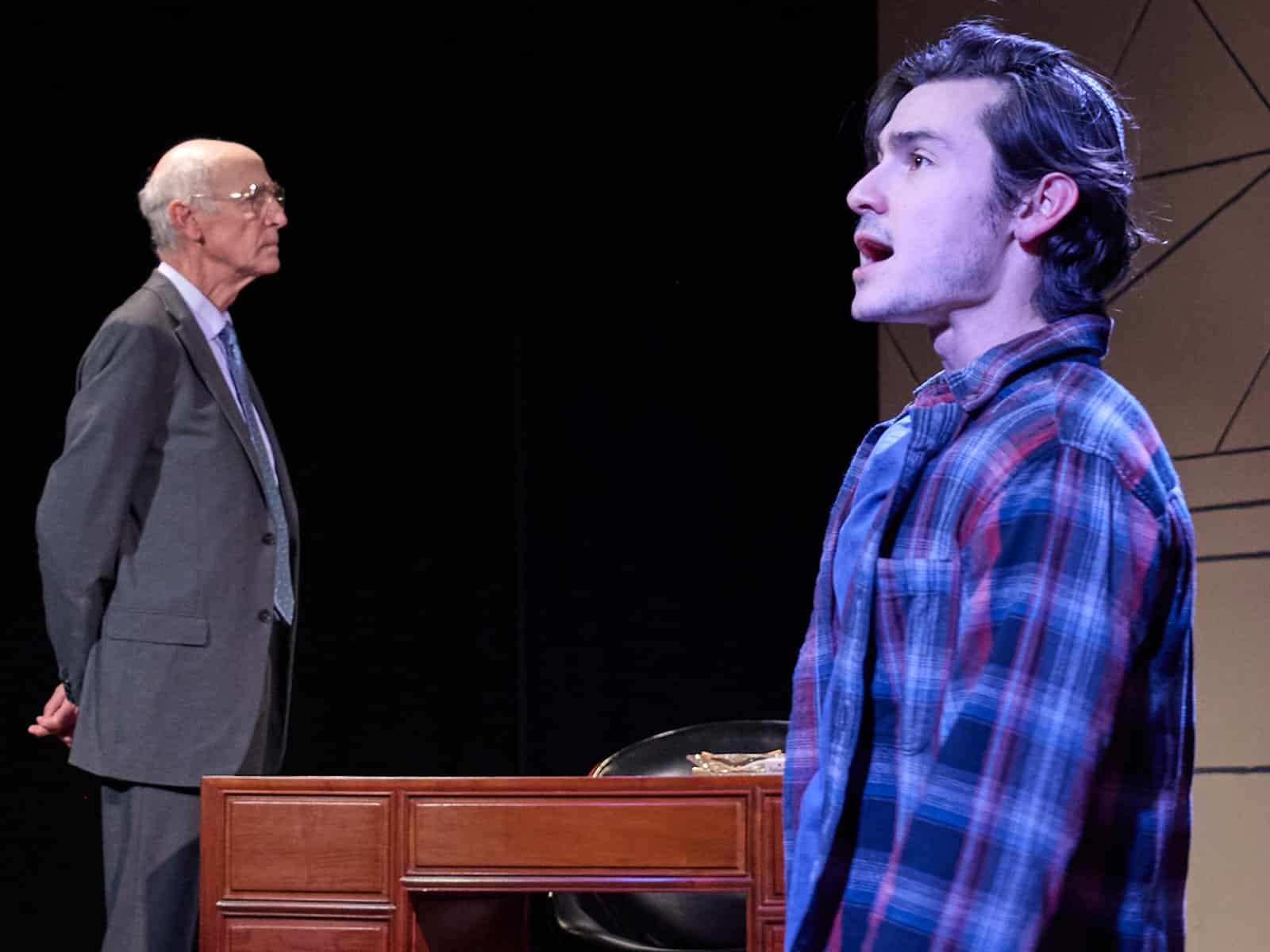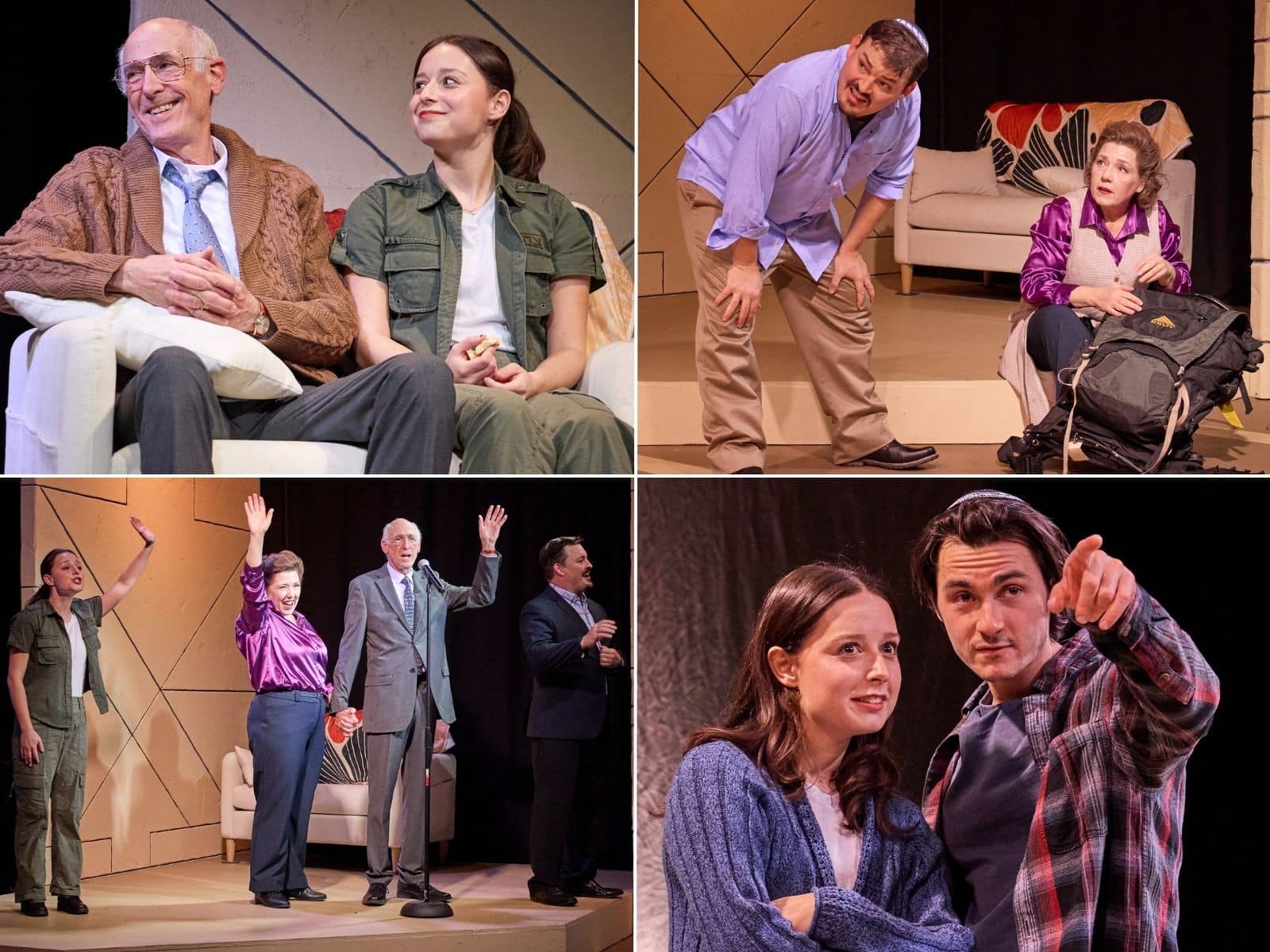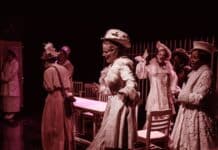By Nicole Hertvik and Daniella Ignacio
In 2025, any conversation about the Middle East is bound to stir up controversy. Even within Jewish communities — in both Israel and the United States — opinions on the military response to the October 7, 2023, Hamas-led attacks on Israel are deeply felt and divided, with some supporting the military response, others opposing it, and still others feeling it hasn’t gone far enough.
Political division among “hawks,” those who favor a hardline, military-first approach, and “doves,” who lean toward negotiations and diplomatic solutions, has characterized Israeli politics for decades. This division is the rich material explored in Voices Festival Production’s November 4, an original musical with music and lyrics by Danny Paller and a book by Jerusalem-based New York Times reporter Myra Noveck. November 4 explores the November 4, 1995, assassination of Yitzhak Rabin, the Israeli Prime Minister and military leader, whose embrace of compromise and coexistence with Palestinians made him a symbol of the Israeli peace movement. The events surround Rabin’s “Yes to Justice, No to Violence” rally to promote peace and counter anti-Oslo agreement sentiment. Rabin’s support for the Oslo Accords — a series of agreements between Israel and the Palestinian Liberation Organization (PLO) — represents the most significant attempt at Israeli-Palestinian peace to date.

The show is a part of VFP’s Voices From a Changing Middle East Festival, which, under the leadership of longtime DC theater leader Ari Roth — himself no stranger to controversy — dives headfirst into the minefield of Middle East politics to humanize headlines coming out of Israel and Palestine and stimulate debate and discourse about potentially divisive topics. Written by an all-Israeli team, November 4 jumps in time between the lead-up to the 1995 assassination of Rabin by Yigal Amir, a far-right Yemenite Orthodox Jew who believed Rabin was betraying Israel by cooperating with Palestine, and a present-day Israel at war with Palestine.
Note that because this show is so ripe for analysis, the perspective of just one critic didn’t seem like enough, so two DCTA critics — neither of them Jewish, both a bit sheepish about wading into the explosive realm of Middle East politics — have teamed up to attend the show and reflect on it. Here’s where we think the show succeeded and where it has room to improve.
Political assassination is a lot to put into theatrical form, and Voices Festival Productions raises the challenge even further by tackling this material not just dramatically but as a musical. And it is precisely in the musical retelling of this important moment in history that the play fails to soar. With a series of largely forgettable songs — some of which could be struck from the play entirely (looking at you, vaudeville number about Barbra Streisand attending Yitzhak’s peace rally, when she ended up not even coming anyway), and many that box the characters into surface-level stock caricatures — the story seems to lack depth, despite its attention to historical detail.
Moments that the creative team chooses to expand are often perplexing, including a duet between Rabin’s assassin and his girlfriend that — while beautifully sung — fails to move the plot forward or give us an understanding of the factors of his life that shaped Amir into an assassin. An end-of-show number featuring three security guards in an underground parking lot succeeds in pointing out the chilling fact that Rabin’s assassin is Israeli, but also drags the show along at a point where it should be reaching its climax.
And more emotional depth in the lyrics would go a long way. For example, in Rabin’s first song, “Patience,” he questions: “And why can’t Oslo just move along at a faster pace / And why can’t Arafat put Hamas in its place? / And when will our settlers finally face the music?” These are all important issues, but in song form, these simple questions feel casual, flippant, not weighty, in search of a rhyme, to the point of parody. One might think: no one would actually say these words, much less a prime minister.

The company, in the able hands of Director Alexandra Aron, is doing the best it can with material that prioritizes sharing facts over storytelling. Scenes from daily life, such as Rabin’s wife and granddaughter watching protests on TV together, often read as “look, we did research.” Rabin’s defining quality, for example, is his unwavering commitment to peace and his stubborn confidence that he will be fine in the face of assassination threats; you never quite see him with his guard down. It would be nice to see where this comes from.
In contrast, the most effective moments were monologues directly addressed to the audience by Nicole Halmos as Shoshi, Rabin’s secretary, who is sympathetic to Palestinian civilians, and Emma Wallach as Shalhevet, the former girlfriend of Rabin’s assassin, who shares some of his conservative views but does not condone the assassination. Their pain, warzone trauma, feelings of being wronged, and desperation for peace are palpable. When each shares their perspectives side by side, the production succeeds in its mission to illustrate the myriad voices that contribute to Israeli life and politics. These first-person perspectives are reminiscent of documentary theater — a tool that may be a better approach for future iterations of this show. The emotional weight of these reflections is far more powerful than the overwrought lyrics in some of the show’s songs.
It’s also hard to tell who goes down in history as good or bad without the timeline provided in the show’s program. One might question whether Rabin was wrong to work for peace, given that his assassin repeatedly stated a desire to “save our people.” Other characters condemn him, but the fundamental act of showing an assassin spouting cartoon-like villainy, and being supported by his brother (Chris Daildeader, who’s the most chameleon-like of this ensemble cast and characterizes his multiple roles with strong emotional commitment and distinction). Of particular note is a sequence where his brother provides him with weapons and they plot the assassination, which feels strange to see for a long period of time unchecked. If the point is to cringe at the portrayal, point taken. One might just wish we didn’t have to see an assassin who thinks Palestine shouldn’t exist singing a heroic musical theater ballad (“Flying Close to Heaven”) or rally anthem (“Hey, Sweetie”), no matter what other characters say.
The musical’s soaring orchestrations by Talia Erdal and Bar Halevy, with additions by Music Director Paige Rammelkamp, almost save it and are a highlight of the show. A live pit band backs up each song with rich, flowing melodies performed on piano (Rammelkamp, who also conducts), clarinet (Nick Graziano), and cello (Kate Rears). Musical highlights are “Peace Song,” a sweeping ensemble piece that opens the show with Hebrew and Arabic lyrics and is reprised to great effect at the show’s end, and “Feel It,” which captures the high stakes before the rally and feels like a setup for denouement (which is then followed by seven more songs that could have been cut or shortened).
The cast of five does exceptional work with the material. Emma Wallach stands out in the dual roles of Noa, Rabin’s granddaughter, and Shalhevet, the onetime girlfriend of Rabin’s assassin. Her stunning portrayals bring high stakes, youth and maturity, vulnerable emotional connection, and a powerful, agile soprano voice.
As for the prime minister and his assassin, these depictions felt nuanced and subtle, with the actors working hard to make them human. As Yitzhak Rabin, Mitch Greenberg shines when Rabin faces conflict, whether he’s comforting his granddaughter or arguing with constituents who don’t agree on the need to reach peace. As Rabin’s assassin, Yigal Amir, Noah Mutterperl’s performance is understated, charming, and eerily normal, not coming across as a threat until later. It’s reminiscent of the American school-shooter stereotype, a deadly threat walking among us and flying under the radar until it’s too late.
Scenic Designer Lauren Helpern has crafted a simple yet beautiful set that allows the action to pivot through a variety of locales. Costume Designer Deborah Caney captures the feel of the Middle East through outfits like Noa’s Israeli soldier’s uniform and Shalhevet’s conservative head wrap. Lighting and Sound Designers Alberto Segarra and Justin Schmitz evoke the feel of crowded protests. Props by Chelsea Dean include pro- and anti-Israel and Palestine signs that fill the stage at the top of the show.
Despite our criticisms, November 4 is a show worth seeing, and further developing. While far from perfect, the musical offers a laudable contribution to discourse on a path forward in the Middle East, which is never more urgent and necessary than right now.
Running Time: One hour and 45 minutes.
November 4 plays through December 7, 2025, presented by Voices Festival Productions performing at the Universalist National Memorial Church, 1810 16th St NW, Washington, DC. Purchase tickets ($25–$65) online.
The program for November 4 is online here.
November 4
Music and Lyrics: Danny Paller
Book: Myra Noveck
Concept and Story: Danny Paller and Myra Noveck
Director: Alexandra Aron
SEE ALSO:
Why did two Gentiles enjoy a musical about the assassination of Yitzhak Rabin? (response to November 4 by John Stoltenberg and Sophia Howes, November 28, 2025)
Voices Festival Productions announces ‘November 4’ cast (news story, October 1, 2025)
Voices Festival Productions announces three-play ‘Voices from a Changing Middle East Festival’ (news story, August 2, 2025)



